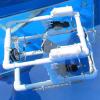UGA STEMzone Educates Football Fans About Science

Photo Credit: STEMzone Media Team
Butterfly migration will be one of the topics covered at STEMzone.
Last month, the Intergovernmental Panel on Climate Change released a special report on global warming. The panel reported that limiting warming to a 1.5 degrees Celsius increase above pre-industrial levels—compared to 2 degrees C—would benefit both humans and natural systems, and authors discussed the “rapid and far-reaching” changes necessary to achieve this goal.
Public responses to this report have varied. Some claim the authors have been too conservative, and some fear that we will not be able to adhere to the ambitious measures necessary to slow the damage. But one thing is clear: Climate change is complicated, and that is reflected in public opinion.
In May, the Pew Research Center reported that 52 percent of U.S. adults believe it is possible to protect air and water quality while limiting environmental regulations, an opinion that seemingly contrasts with the latest IPCC report’s call to action. Climate change is no exception to partisan bickering, and opinions on environmental concerns are often divided by party lines. Although it is easy to focus on what divides us in today’s political climate, organizations like STEMzone UGA are taking a different approach—using our shared curiosities about the natural world as a starting point for entering into more complicated conversations.
STEMzone UGA—a science outreach event founded by Odum School of Ecology PhD candidate Reni Kaul—offers UGA graduate students and organizations the opportunity to share their research with football tailgaters in a relaxed and interactive setting. ECOGIG, a research consortium that emerged in the aftermath of the Deepwater Horizon oil spill off the Louisiana coast, paved the way for STEMzone when Samantha Joye, ECOGIG project director and professor in the UGA Department of Marine Sciences, initiated “Science at the Stadium” to highlight ECOGIG research efforts and technology in the broader context of global ocean health.
Now, in STEMzone’s second year, students from a variety of STEM disciplines will fill the lawn of the Miller Learning Center five hours before kickoff for the Auburn game, from 2–7 p.m. on Nov. 10, to share their research.
This year’s booths will once again feature the breadth of research interests represented at UGA, with the Warnell School of Forestry and Natural Resources offering introductions to a host of reptiles, ECOGIG guiding eager operators on how to drive underwater remotely operated vehicles, and the MathZone challenging visitors with mind-bending puzzles.
But for those eager to exchange ideas of the more complicated variety, conservationist John Muir’s reminder, “When we try to pick out anything by itself, we find it hitched to everything else in the universe,” will be alive and well on the MLC lawn. Attendees will learn that humans are hitched to climate change and a host of other environmental and scientific challenges being tackled by the UGA STEM community.
Odum School of Ecology students will lead a “Migration Station” booth in conjunction with Project Monarch Health (monarchparasites.org), where Cece Working, an Odum PhD student, will educate visitors on monarch butterfly health.
"Monarchs migrate annually from Canada to Mexico, but climate change is impacting their migratory route,” Working says. “Temperature is an important cue that helps monarchs determine their timing of migration, so higher temperatures alter their ability to start breeding season at their historical timing.”
EcoReach—an organization devoted to teaching youth throughout northeastern Georgia about ecology and the environment—will focus on human relationships with the wildlife in our backyards. Kaylee Arnold, a PhD student in the UGA IDEAS program and president of EcoReach, will communicate a message of stewardship.
“We want every kid that we speak with, and their families, to take notice of what type of wildlife is around them, recognize when humans are altering their habitats and learn how we can work to preserve these natural spaces,” Arnold says.
Rachel A. Perry, a PhD student in the Department of Marine Sciences, will focus on the widespread impacts of marine debris. “A significant portion of the world and the United States economy relies on healthy oceans. Those working in fisheries, restaurants that serve seafood, any sort of coastal recreation and tourism or real estate will be negatively affected by trashy seas once their consumers’ health becomes a concern,” Perry says.
“The STEMzone event should be a really neat venue to discuss science and current events with people from a wide range of ages and backgrounds,” Perry says. “If we can engage just a few minds at the event, we are sure to stimulate curiosity in science, and hopefully a change for the better in our environmental practices.”










comments